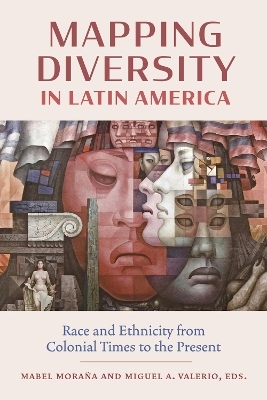
Mapping Diversity in Latin America
Vanderbilt University Press (Verlag)
978-0-8265-0725-9 (ISBN)
- Noch nicht erschienen (ca. Januar 2025)
- Versandkostenfrei
- Auch auf Rechnung
- Artikel merken
Mapping Diversity in Latin America offers ample critical coverage of recent approaches to the historical study of race and ethnicity in Latin America since the arrival of Spanish and Portuguese colonizers to the present. Bringing together the work of leading scholars, this volume presents readers with a thorough and updated examination of the formation and evolution of ideas surrounding race and ethnicity, social movements, and political processes in Latin America that provides multiple routes for future research on the topic. The book’s nineteen chapters establish the basis for a productive comparative analysis of racial developments in the whole continent to allow for a combination of diachronic and synchronic study of regional processes. Both the scope of the book and the historical and geocultural coverage on these topics are unique in the field of Latin American Studies.
Taking an interdisciplinary approach to understanding issues of collective identity, otherness, alterity, and the like, Mapping Diversity in Latin America sheds light on histories that have been traditionally overlooked in texts on race in Latin America, such as the rich history of diasporic Asian, Syrian Lebanese, and Jewish communities, and the more recent emergence of Latinx populations in the United States. The book includes a critical examination of fundamental concepts such as mestizaje, mulataje, creolization, negritud, and blanquitud, as well as critical and theoretical approaches to the study of these issues in postcolonial societies.
Mabel MoraÑa is the William H. Gass Professor in Arts and Sciences at Washington University in St. Louis. Miguel A. Valerio is an assistant professor of Spanish at Washington University in St. Louis.
Introduction: The Question of Race in Latin America (Mabel MoraÑa)
Part 1: The Racial Other in Colonial Times
Chapter 1: Foundations of Race and Colonialism in Latin America (Amber Brian and MÓnica DÍaz)
Chapter 2: Race and the Baroque: Social Actors and Christian Subjects in Seventeenth-Century Lima and Mexico City (Stephanie Kirk)
Chapter 3: African Slavery in Latin America (Miguel Valerio)
Chapter 4: Race in Eighteenth-Century Spanish America (Mariselle MelÉndez)
Part 2: Race and Nation
Chapter 5: Genealogies of Blanquitud/Branquitude: From Critical Race Theory (CRT) to Critical Whiteness Studies (Ruth Hill)
Chapter 6: Central America’s Indigenous Peoples: From the Independence to the Consolidation of Exclusionary National Imaginaries, 1810–1930 (Patricia Arroyo Calderon and Marta Elena Casaus ArzÚ)
Chapter 7: Reconsidering “the Racial Other”: Nation-building, Citizenship, and Interracial Alliances in Latin America and the Caribbean (Jorge Daniel VÁsquez)
Chapter 8: Looking through Layers of Jewishness in Latin America (Ariana Huberman)
Chapter 9: Race and Nationalism: Hierarchical Imaginaries, Institutional Racism, and Fantasies about the Mestizo (IvÁn Fernando Rodrigo-MendizÁbal y Marcel VelÁzquez Castro)
Chapter 10: Inter-ethnic Conflict and Socio-cultural Contributions of Asian Diasporas in Latin American and the Caribbean (Ignacio LÓpez-Calvo)
Chapter 11: Mobilizing Black Culture against Racism: The Negritude Movements in Latin-America (Carlos Alberto Valderrama Renteria)
Chapter 12: Beyond Binaries: Genealogies of Mestizaje and Mulataje in AmÉfrica Ladina (Agustin Lao-Montes)
Chapter 13: Genealogy of Indigenist Translations: From Colonized Methodologies to Indigenous Self-determination in Peru, Twentieth and Twenty-First Centuries (Christian Elguer)
Chapter 14: On Democratic Imaginaries in a Discriminatory Society:The Paradoxes of Racialized Experience in Indigenous and Afro-Brazil (Tracy Devine GuzmÁn)
Part 3: Conceptualizing Diversity
Chapter 15: From Creolization to CrÉolitÉ: Creole Subjectivities and Racial Divisions in Caribbean Societies (Ariel Camejo)
Chapter 16: Race Relations in Contemporary Central America: From State Violence to Indigenous Empowerment, 1940s–2021 (Patricia Arroyo CalderÓn and Marta Elena Casaus ArzÚ)
Chapter 17: Racializing Sirio-Libaneses in Latin America (Bahia Munem)
Chapter 18: Ethno-Racial Landscapes in Argentina, Uruguay, Paraguay, and Chile: From Assimilation to Contestation (Gonzalo Aguiar)
Chapter 19: Chicanos, Hispanos and Latinos (BÁrbara I. AbadÍa-Rexach)
| Erscheint lt. Verlag | 15.1.2025 |
|---|---|
| Verlagsort | Tennessee |
| Sprache | englisch |
| Maße | 152 x 229 mm |
| Themenwelt | Geisteswissenschaften ► Geschichte ► Regional- / Ländergeschichte |
| Sozialwissenschaften ► Ethnologie | |
| Sozialwissenschaften ► Soziologie | |
| ISBN-10 | 0-8265-0725-5 / 0826507255 |
| ISBN-13 | 978-0-8265-0725-9 / 9780826507259 |
| Zustand | Neuware |
| Informationen gemäß Produktsicherheitsverordnung (GPSR) | |
| Haben Sie eine Frage zum Produkt? |
aus dem Bereich


